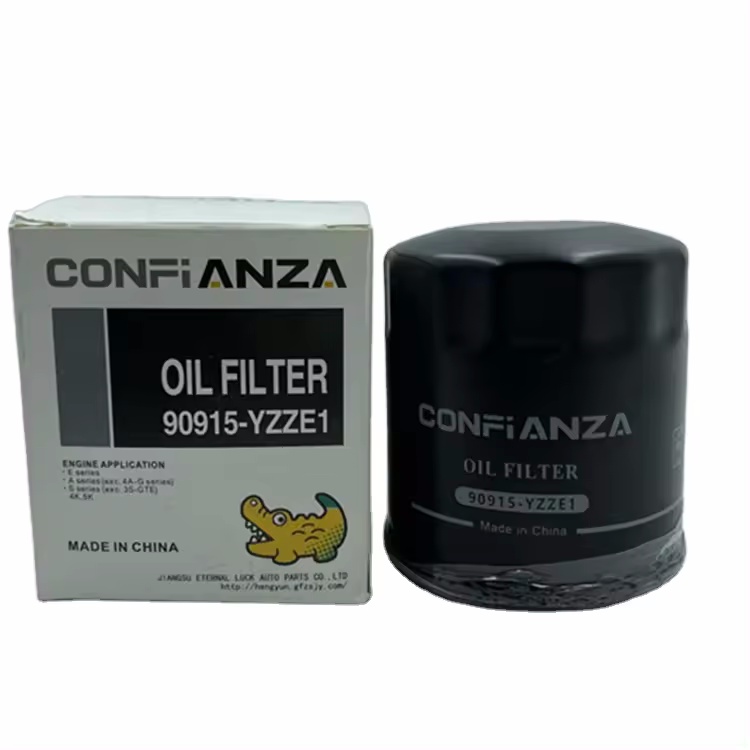Oil Filter 90915-YZZE1
The oil filter 90915-YZZE1 is a crucial component in ensuring the proper functioning and longevity of an automobile's engine. Designed to trap contaminants such as dirt, debris, and metal particles, it plays a vital role in maintaining the cleanliness of the engine oil, which is essential for optimal engine performance.
Oil filter cross reference
Constructed with high-quality materials and engineered to meet stringent standards, the 90915-YZZE1 effectively removes impurities from the circulating oil, preventing them from circulating through the engine and causing potential damage. Its robust design ensures durability and reliability, even under extreme operating conditions.
Oil filter lookup
Regularly replacing the oil filter is essential for maintaining engine health and prolonging its lifespan. Over time, the filter becomes saturated with contaminants, reducing its effectiveness and potentially leading to engine wear and performance issues.
Purolator oil filter
Choosing genuine 90915-YZZE1 oil filters ensures compatibility and adherence to manufacturer specifications, guaranteeing optimal performance and protection for your vehicle's engine. Investing in quality filters like the 90915-YZZE1 is a proactive measure in safeguarding the heart of your vehicle, promoting smoother operation, improved fuel efficiency, and overall peace of mind on the road.
F: When should I change my oil filter?
Q: Every oil change. There are a plethora of reasons listed by others below.
The mentality [of changing every 2nd or 3rd oil change] was last popular on economy vehicles, made after the start of the 1973 oil crisis. General Motors pushed this mentality as a way of getting people to buy their [cheaply made] economy cars (such as the Chevette) by offering not just a low sales price, but “low” maintenance costs, by stating that the oil filter only needed to be changed every second oil change. In actuality, this was both to wow people into how cheap this [crappy] car was going to be to maintain, and how GM had a very bad habit of reusing the same engines in a multitude of cars, that the oil filter was often located in an unnecessarily difficult place…therefore to minimize complaints, they just suggested changing it every second oil change. Because of some of the lousy locations of these filters, many people didn’t bother changing the filter…ever.
F: How long can an oil filter last?
Q: When the oil is no longer clean. If you're draining clean oil out the engine it is too soon to replace the oil and filter. Oil gets contaminated by blow by and water moisture. That is why an engine that is rarely ran or stored should be ran to operating temps every week or so.
The oil needs to lube and coat the system to prevent the bearing and rings from going bad from corrosion and it also needs to get hot enough to remove water from it via evaporation and the pcv system.
If the oil looks and feels good, don't replace it or the filter. If it looks or feels bad then replace them. New vehicles, with the oil life meters, measure oil for viscosity and contamination and tell you when to replace the oil based on those attributes plus driving conditions and time cycle.
Mostly based on oil condition though and less on time. The increased engine temps of modern engines keep the water vapor in the crankcase from forming in the oil and the PCV system sucks it out.
Tighter tolerances and thinner oils allow better filtering and less blow by, that is why modern engines oil change intervals are so much longer. That and we, as a society, were tricked into thinking the oil should be changed every 3K or 3 months.
The only time I have ever changed my oil in less than 6K miles was right after I rebuilt my engine during the first 1500 miles of break in. Since then, I do it based on Duramax oil filter condition and that is all. It should be noted that oil condition should be checked at operating temperature when engine running or just after shut off.
Oil level should be check 10-30 minutes after shut off. However, rust from the cylinder walls will form in time depending on relative humidity of the storage environment, of course. That rust will scrape off the cylinder walls, into the oil, then the pump, then filter. But, if observed properly should be a non-issue.
MESSAGE
Please contact us now, your inquiry will be answered soon!








